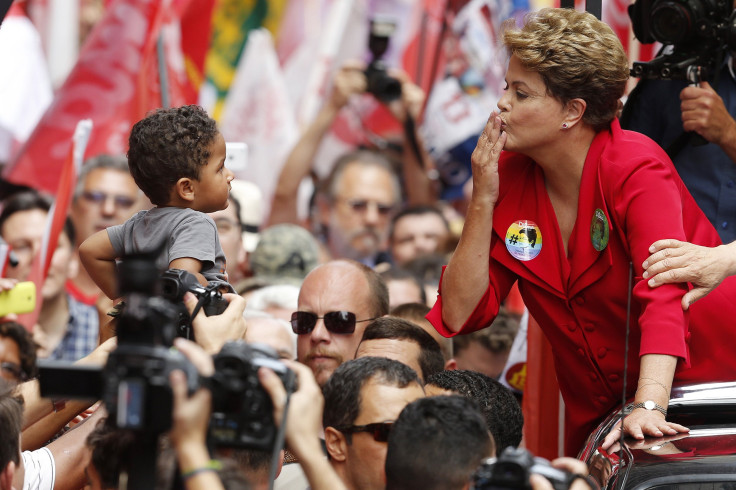Brazil Election 2014: Rousseff Just Barely Ahead Of Neves In Last-Day Polls

With just hours to go before Brazil opens up the voting booths for its nail-biting presidential election, opinion polls indicated incumbent Dilma Rousseff and challenger Aecio Neves were in a dead heat. Several polls indicated the candidates were less than a point to 6 points apart, but error margins made the race too close to call.
Polling firm Datafolha estimated a 4-point lead for Rousseff with 52 percent of voters’ support and 48 percent for Neves. Ibope, Brazil’s other major pollster, showed Rousseff 6 points ahead of Neves, 53 percent to 47 percent. But with a 2-point margin of error, analysts said the numbers indicate the candidates are locked in a dead heat. A poll by MDA indicated an even smaller gap with 49.7 percent for Rousseff and 50.3 percent for Neves.
Recent data has suggested Rousseff’s momentum was growing in the race due to a tight campaign and an uptick in economic figures, and the region’s history -- only two incumbents have lost re-election races in Latin America in the last 30 years -- indicates the president may prevail. But observers also note polling data had failed to show Neves’s growing support in the first round of the presidential race, leading to widespread surprise after he beat out Socialist Party candidate Marina Silva Oct. 5.
Recent allegations implicating Rousseff in a political corruption scandal have also thrown a wildcard into the electoral mix. Weekly magazine Veja reported Rousseff and former President Luiz Inácio Lula da Silva were aware of a kickback scheme between state-owned oil company Petrobras and the ruling Workers’ Party. The allegations were the main subject of Friday night’s heated debate between Rousseff and Neves, the last presidential debate of the campaign season.
Neves slammed Rousseff and the Workers’ Party over the allegations while Rousseff insisted the accusations were unfounded. On Friday, she accused Veja of “electoral terrorism” for its report, saying the magazine was trying to derail her campaign. Lula also hit back against the accusations and promised to sue the magazine for libel.
© Copyright IBTimes 2025. All rights reserved.






















